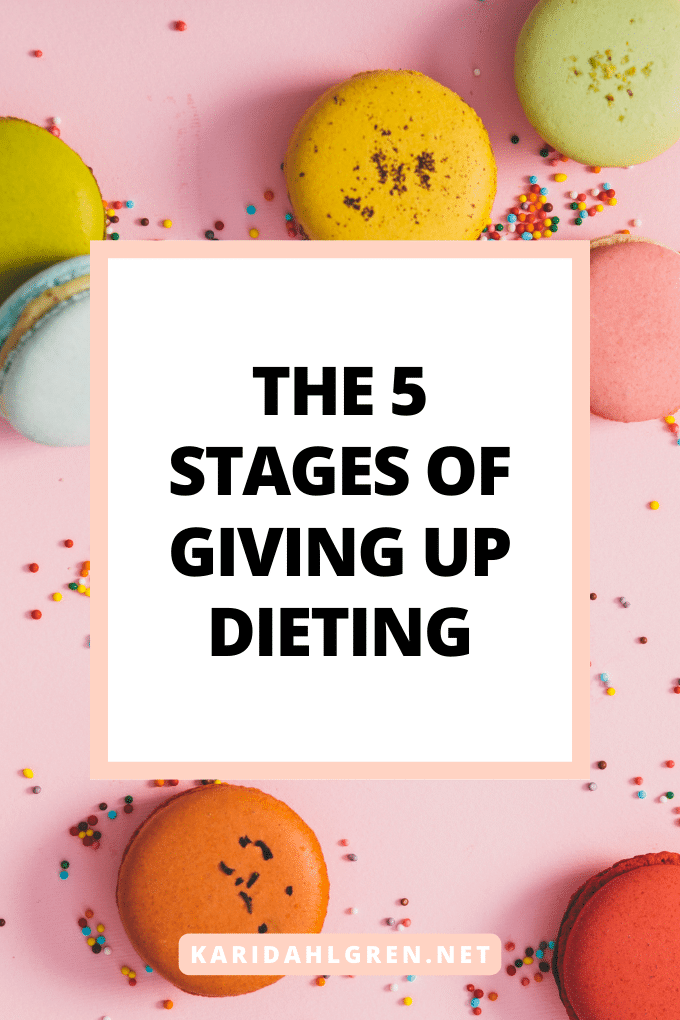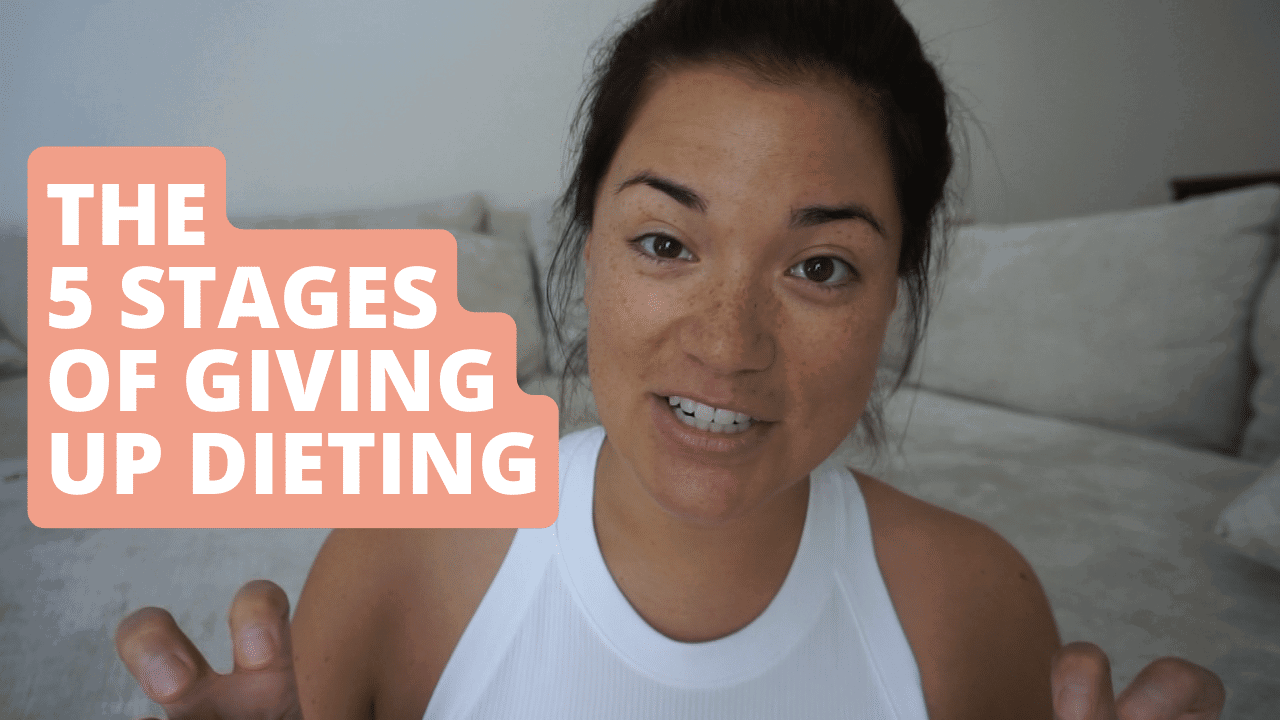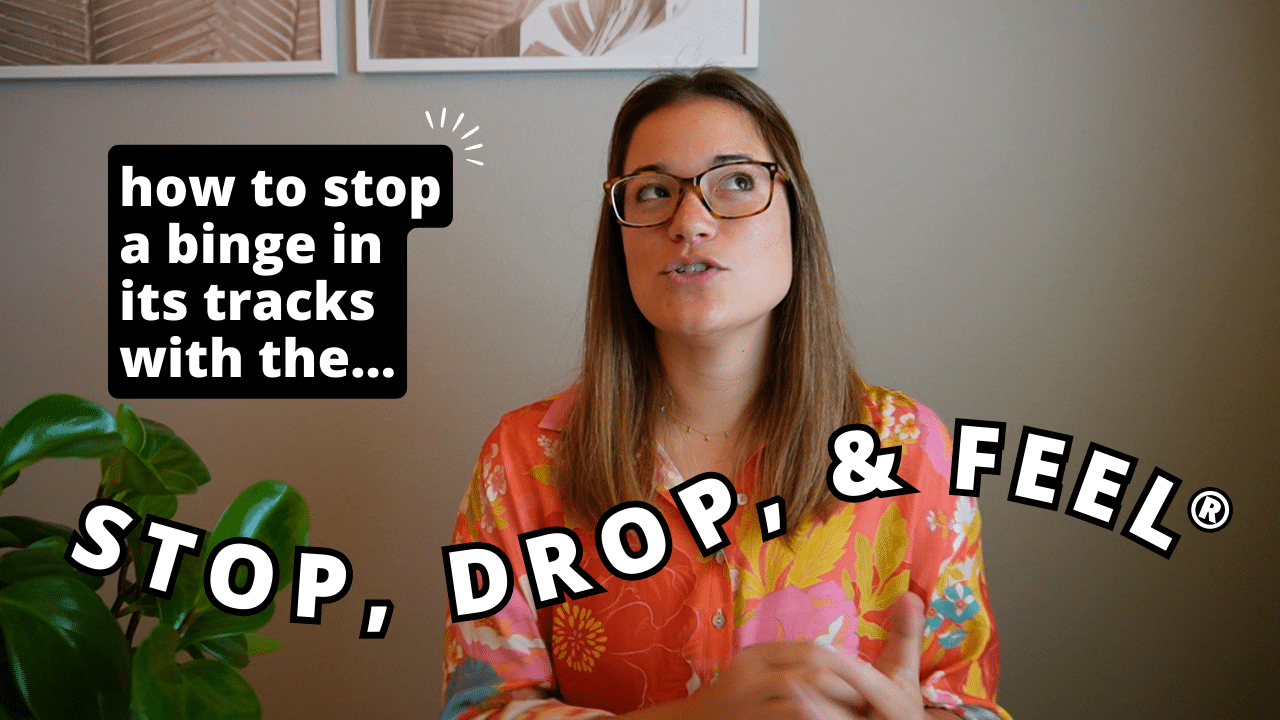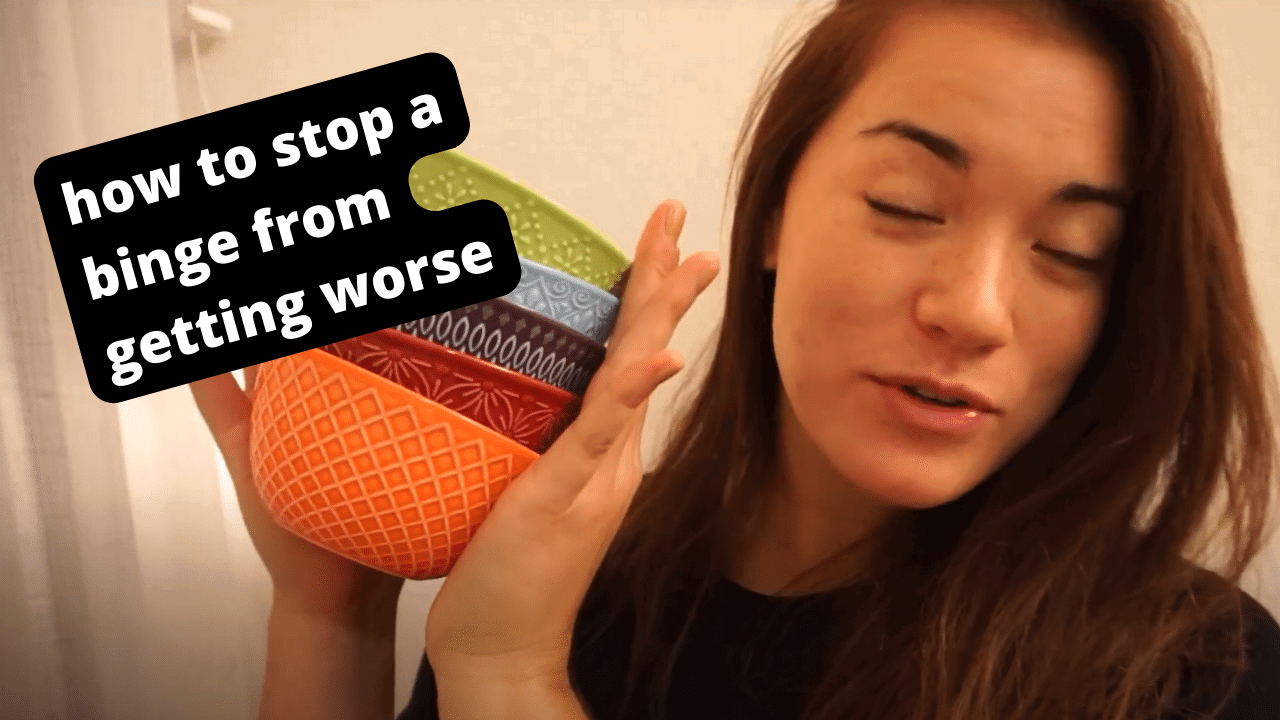
Curious to know what happens when you stop dieting? Right up front, there’s the looming fear of gaining weight and, on top of that, feeling out of control. That’s enough to make most people run in the other direction. However, when you understand that this is normal and to be expected—and it will eventually lead to feeling normal around food instead of feeling crazy or obsessive—it can help make the process less intimidating.
It also helps to focus on what can go right instead of what can go wrong. Some of the incredible benefits of giving up dieting include letting go of the restrict-binge cycle and all the guilt and emotional exhaustion that comes with it. By forgoing strict food rules, you can learn to eat based on your body’s natural cues of hunger and satisfaction, which can help you cultivate a healthier relationship with food.
This not only alleviates stress associated with food rules but also frees up energy for other enriching life pursuits, which builds up your self-confidence instead of tearing it down. Not to mention, giving up dieting is one of the cornerstones of building a healthy, nourishing, and sustainable relationship with food—one without weight cycling (gaining and losing the same set of pounds over and over again).
To help you prepare for this journey, you’re about to learn the 5 stages that everyone goes through when they give up dieting. When you learn what happens when you stop dieting, you become aware; but awareness doesn’t help unless there are clear actions to create change. That’s why I made sure to include some actionable tips at the end.
Giving up dieting was one of the most courageous undertakings of my life, and it was certainly a messy process. While I can’t promise that your process will be any less messy, I think it certainly helps to know what to expect.
Also, at the end of this post, there’s a free ebook that can help you work through the process of stopping compulsive eating without dieting ever again. It’s called The Spiritual Seeker’s Guide to Stop Binge Eating. If you want it now, click here to gain instant access to it.
Video: What Happens When You Stop Dieting
Generally, people follow 5 stages when they give up dieting. The second stage—the Rebellion Binge phase—is arguably the hardest and biggest deterrent for people who want to give up dieting but are afraid of gaining weight without food rules.
Here’s my YouTube video where I explain exactly what happens when you stop dieting:

I hope that, by understanding the process of giving up dieting, and knowing that the Rebellion Binge stage is something we all go through, it helps ease some of the anxiety. At least, I hope it eases any anxiety enough for you to take the plunge anyways. After all, giving up dieting is a critical step on the path to feeling normal around food.
Having delved deep into the stages of giving up dieting, it’s essential to understand the root of why many of us even began dieting. What drives us toward the cycle? The allure of diets often comes from their promises of quick weight loss solutions. However, it’s crucial to look beyond the immediate results and consider the longer-term consequences of these practices.
Even though diets may help with weight loss short-term, dietary restriction eventually leads to binge eating, which causes weight gain. This is based on the universal principle that, for every restriction, there is an equal and opposite binge. It is also based on clinical evidence that dieting is a predictor of long-term weight gain, not weight loss.
If you want to make real change, look past the surface level of dieting and look at your psychology. After all, this is the home of Psycho-Spiritual Wellness: a path to stop compulsive eating based purely in eating psychology and spirituality, not dieting.
Preparing for the 5 Stages of Giving Up Dieting
Perhaps you’re drawn to the idea of giving up dieting because you’ve come to recognize that a rigid approach to food and weight can be both physically and emotionally draining. For many of us, years or even decades of dieting can lead to a cycle of restriction, overeating, guilt, and shame. Abandoning this cycle can pave the way for a more holistic and intuitive understanding of your body and its needs.
Instead of being governed by strict rules about what you should or shouldn’t eat, giving up dieting will allow you to tune into your body’s own signals of hunger, fullness, and satisfaction. This often leads to a more peaceful relationship with food, where eating becomes a source of nourishment and pleasure rather than a source of stress or anxiety.
Of course, this is much easier said than done. And while nothing can necessarily make the process of giving up dieting easier, it does help to anticipate and understand what happens when you stop dieting; that way you can at least be mentally prepared and equipped with all the right tools.
Up next, you’ll discover the 5 stages of giving up dieting. After that, you’ll discover some helpful tips to put everything into action.
Stage 1: The “Freak Out”
Choosing to give up dieting is often a Hail Mary for many of us. And when yo-yo dieting robs us of our self-esteem, it diminishes the trust that we have in ourselves. Unfortunately, without self-trust, the idea of giving up dieting can seem utterly ridiculous; as if the only possible outcome is weight gain because we can’t (yet!) trust our ability to listen to our bodies to inform what and when we eat.
For most of us, the day we give up dieting is marked by both fear and hope. While you have some faith that this could work, you’re also petrified that it will only end with weight gain. The “freak out” is normal.
The day that I gave up dieting was August 8, 2016. I remember the day vividly. I was feeling hopeless after ‘ruining’ a week of eating well with a night-eating blunder, and I was driving to the beach to get some zen time stretched out on the sand. After laying on the beach and feeling both uncomfortable in my body and insecure about how I look in a one-piece bathing suit, I kind of broke—but in a good way.
I had already been mulling over the idea of giving up dieting and the potential it had for finally being the thing to set me free from the shackles of yo-yo dieting. I did not have enough faith in myself to take the plunge. But there was something about that moment where I became fed up.
I was fed up with gaining and losing the same 10 pounds over and over. I was fed up with feeling insecure in my body. I was fed up with hanging my self-esteem on the way I looked instead of the way I felt or the values I live by. I was just fed up.
Feeling fed up with the ineffectiveness of dieting is fertile ground in which to begin the journey of giving up dieting. It can provide some necessary gumption on this most courageous journey.
That said, no matter how strong your mindset is when you begin, know that The Freak Out is coming, and at some point, feeling fed up with be replaced with feeling out of control. This is normal and to be expected.
Stage 2: Rebellion Binges Are Likely to Occur—Stay Committed
Unfortunately, the most vulnerable stage of giving up dieting comes next: the Rebellion Binge Phase. Generally speaking, binge eating involves eating large amounts of food, often without hunger, accompanied by feeling out of control, among other diagnostic criteria.
Rebellion Binges involve eating previously restricted “bad foods” or “forbidden foods” usually without hunger and typically without feelings of being in control. For example, if you used to restrict carbs and sugar, then a Rebel-Binge might involve binge eating donuts or cookies.
This phase is arguably the scariest because it presses right up against the fear of gaining weight. Before, during, or after a Rebel-Binge, your mind might sputter something like, “Forget this! I don’t want binges! See?! I don’t have enough self-control to give up dieting. This is exactly what I was afraid would happen!!”
To make it through this phase, remember that it’s a temporary phase and it’s a rite of passage that everyone goes through. I went through it, and so has everyone else that’s gone through the process of giving up dieting. It’s normal and to be expected.
(There are specific tips on navigating the Rebellion Binge phase near the end, so stick with me.)
Stage 3: Life Suddenly Gets Worse in Seemingly Unrelated Areas
If you’re feeling demoralized or discouraged by what happens when you stop dieting, please don’t! While the first two stages are difficult, there’s only one more difficult stage before things start to swing in a positive direction and you start to feel normal around food.Alas, though, there’s no easy way to say it. During the third stage of giving up dieting, life will suddenly feel worse somehow. Maybe something difficult happens at work or with a family member. Perhaps you have a bout of bad luck. It looks different for everyone, but at some point, life will hit you like a Mack truck. This is normal and to be expected.
Because it’s not that life suddenly threw you an unfair curveball. It’s that life has always been throwing you curveballs—you’re just finally feeling it. Without dieting or overeating to buffer your discomfort, you’ll feel the depths of the pendulum swing much deeper than before.
We are all familiar with the concept of emotional eating, where we eat to buffer uncomfortable emotions. But not many of us realize that dieting is also a buffer. It gives us hope and a (false) sense of control (as controlling what you eat only ever results in overeating).
When we give up dieting, we surrender control and we also surrender hope sometimes (thanks to stage #1). And once we get a grasp on navigating the urge to eat without hunger (more on this later), we are suddenly buffer-less. Then, when life eventually gets difficult, as it always does periodically, you’re going to feel it that much harder. This is good. It’s an unsuspecting sign of progress.
Stage 4: You Find Food-Normal—With Some Turbulence
Finally, the sun emerges from behind the dark, gloomy clouds of stages 1, 2 and 3. You’ve been dragging your feet through the stages of what happens when you stop dieting, and you’ve made it through The Freak Out, The Rebel-Binges, and whatever difficult thing life threw your way. You made it. You feel normal around food—mostly.
Once you get to stage 4, you’ve developed some self-trust and you’re comfortable having your once-forbidden foods. They no longer tempt you. Suddenly, you can buy a bag of brownies and only eat two bites. While moderation was never the goal, it becomes natural. And when you do have brownies because it’s genuinely what you want, you enjoy them shame- and guilt-free.
At this stage, things don’t necessarily become easy, but you gain your footing. When life throws more curveballs your way, you’re ready for them. You know what to expect, and you’ve developed fortitude within yourself to weather any storm while staying true to yourself instead of overeating.
Also, your self-esteem is slowly improving. Instead of looking in the mirror and struggling with thoughts of ‘I feel fat and ugly,’ you look in the mirror and see someone that is mentally tough. Self-esteem is not built in a day, but you’re slowly learning to stop criticizing yourself so much.
It helps build self-esteem when you’re not breaking any food rules, and lucky for you, there are none!
During stage 4, when things get too uncomfortable, you may overeat every now and then, but it’s nothing crazy. You are truly making strides in your relationship with food and body acceptance. This was the stage I was in when I wrote about slipping back into some overeating after I gave up dieting—almost abandoning ship and resorting back to dieting, but ultimately saying committed and pushing through to stage 5.
Stage 5: You Become The Phoenix—Diet Culture Is Far Behind You
After remaining 100% committed to giving up dieting, you come out on the other side. It was a turbulent ride, but you did it! The work is never really over, but you’re now equipped with the skills to stop dieting for the long haul.
At stage 5, feeling normal around food emerges. You can go to social gatherings and have any kind of food in front of you without going on binges. Not only has your eating behavior changed, but the foods that you crave have changed too. Instead of craving your once-forbidden foods for the sake of being rebellious, you crave them occasionally for a sense of fun and satisfaction.
Food stops occupying your every second of every day. You begin to only think about food when you’re hungry, and you’ve developed confidence in your ability to stop when you’re full. When life pushes your limits and you feel tempted to eat when you’re not hungry, you pull out your toolbox and do what you can without criticizing yourself. True confidence and resilience are born!
Now, what exactly can you do to get the stage 5? How can you navigate through each of these stages with grace and confidence that you know what you’re doing?
Navigating the 5 Stages with Grace: Tips and Tools for Success
It’s one thing to know what happens when you give up dieting, but it’s another thing to know what to do as you go through the process. Awareness is essential, but we can’t stop there. We need to take action as well.
The following tips will help you take productive action towards shaking free from Diet Mentality for good. These tips revolve around my framework called the Psycho-Spiritual Wellness Eating Guidelines. They are a great framework to help provide some slight structure during your transition away from dieting.
The Psycho-Spiritual Wellness Eating Guidelines are:
- Eat exactly what appeals to you when you’re hungry
- Stop eating when you’re full
- Feel your feelings when you want to eat when you’re not hungry
Let’s explore some steps that you can take to apply these guidelines to the stages of giving up dieting.
Embrace Permission to Eat
The first guideline involves allowing yourself to eat exactly what appeals to you when hungry. This signifies the process of trusting and respecting your body’s innate wisdom.
Move Past Fear Foods: Initially, unrestricted eating may trigger anxiety, especially around ‘fear foods.’ Remember, it’s about genuine connection and understanding, not just consumption. By giving yourself the freedom to eat any food, you’re reclaiming power over previous restrictions.
Anticipate the Last Supper Mentality: As you grant yourself unrestricted food permissions, it can trigger the fear of weight gain. This fear can cause you to keep one foot out the door, like allowing all foods except sugar. This is a common reaction, especially if you’re coming from a background of rigorous dieting.
Try not to keep one foot out the door, though, otherwise you’ll trigger Last Supper Mentality, which causes us to ‘eat what we can while we can.’ This is characteristic of stage 2 (Rebellion Binges) and you can get stuck here without honoring the element of Permission to Eat.
In a cascade of unfortunate events, Last Supper Mentality and perpetual Rebel-Binges will reinforce the fear of weight gain and make it even more difficult to give up dieting again in the future. Stay committed to allowing all foods and eat exactly what appeals to you when you’re hungry.
Prioritize Emotional Tolerance with the Stop, Drop, & Feel
The Stop, Drop, & Feel® is my #1 tool to stop overeating and it will help you navigate what happens when you stop dieting. It works by promoting emotional tolerance, which is your ability to feel uncomfortable without reaching for a buffer like food. Anytime you want to eat when you aren’t hungry, use this tool. It is crucial for success.

The Stop, Drop, & Feel isn’t just about stopping a binge in its tracks. First and foremost, it’s a tool to develop emotional tolerance. And the SDF always starts with a promise that you can eat exactly what appeals to you when the SDF is over. This honors the element of permission and stops it from becoming another form of restriction—which again, would only keep you stuck in stage 2!
Also, keep in mind that Stop, Drop, & Feel isn’t about deterrence, but rather discernment. It’s about pinpointing the root cause of your cravings. Sometimes, after doing the SDF, you’ll genuinely desire to eat, and that’s perfectly fine and the element of permission must be honored in order for it to work. Even when the SDF does not stop overeating, the clarity it brings will aid in distinguishing between physical hunger and emotional voids.
Know How to Navigate Rebellion Binges
The Rebellion Binge phase is arguably the scariest phase because it touches on our insecurities of having no willpower and gaining weight if we give up dieting. While I have not made a YouTube video specifically for Rebellion Binges, I do have a video that is perfect for this stage nonetheless.
Here is my YouTube video where I explain how to stop a binge from getting worse:

One of my favorite comments on that video is: “So I am ok to binge with flair never thought of that permission is the key thank you.” I thought that was perfect!! Because, in a way, yes, I am encouraging you to binge with flair. Because it’s all about honoring the element of permission while getting rid of the guilt and shame cycle.
When we allow ourselves to eat what we want to eat, and we even have fun doing it, we get these necessary Rebel-Binges out of our system. Of course we want to binge on cookies when we have been depriving ourselves of them for years and years! Once we have enough to feel satisfied and feel safe knowing they’re always available whenever we want them, we can move on.
Remember: if you don’t commit to the process of giving up dieting and keep one foot out the door by keeping some food rules around (like not allowing sugar) then you’ll remain stuck in the Rebellion Binge phase. You need the mental security of knowing the cookies will always be there in order to finally let go of the preoccupation with them. One hundred percent commitment is key!
Understanding What Happens When You Stop Dieting
Giving up dieting is synonymous with giving up control, feeling terrified of weight gain, and above all else, prioritizing our mental and physical health above the desire for weight loss. The process can certainly be messy, but hopefully you feel a little more prepared now that you know what to expect and what to do along the way.
Be sure to give yourself permission to eat without guilt and use your tools like the Stop, Drop, & Feel. This journey is about progress, not perfection. Embrace the messiness of giving up dieting, and let the path to feeling normal around food slowly unfold.




Hi! So when you are in stage two and experiencing binges, should we stop, drop, and feel? Or should we let the binges happen? Also, how long does this stage last?
Hi Savannah! Apologies for my slow reply on this one! YES. You should always be Stop-Drop-and-Feeling. Always. Especially during stage 2. If you follow the tool to a “T” it will become very clear how to get past those rebellion binges. Let me know how you’re doing!! x
The nugget about being satisfied after eating enough of a “no” food and feeling comfortable in the knowledge that it’ll be available when I want it is GOLD. The “eat while you can” is an issue I’ve had for years, but not just around dieting… it’s a problem around mealtimes or when offered snacks by well-meaning friends and family…I have scarfed down food for YEARS anytime it’s available simply because it’s there or being offered. SDF has helped tremendously and I’m currently working on bringing both feet in so I don’t have one out the door.
Yeeessss!!! Amazing self-awareness Ashley. And I think we all feel you on the struggle with food offered by well-meaning friends and family. That one is tricky!! And you are doing the perfect thing for all of it: Stop, Drop, & Feeling. Beautiful!! Thanks for the comment 🙂
I’ve been reading your material for about a week and I’m giving it a go. It all makes so much sense to me. You are describing me in multiple areas. I watched the video on the 5 stages and laughed out loud when you got to stage 3 because it was a like a light bulb went off. So that’s why I feel like this right now. I’m thankful I ran across a post of yours on Pinterest. I’ve been diving deep in all the articles I can find. I’ve already shared this with a friend that runs the same way as me, and I’m about to share it with some family members as well.
I love it Regina! It sounds like it was very satisfying to be able to explain and articulate why you feel the way you feel! Hurray! Keep me posted 🙂 I’d love to know how things go.